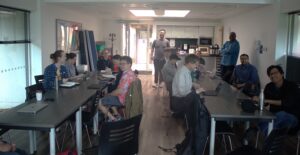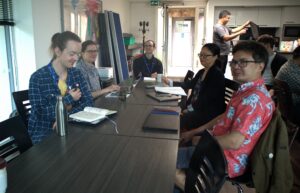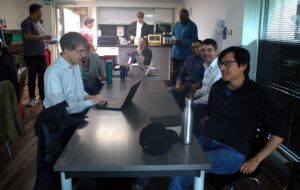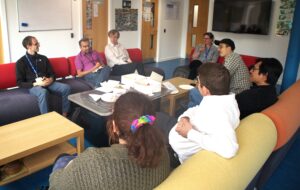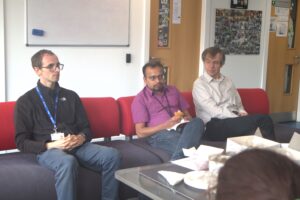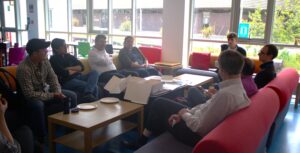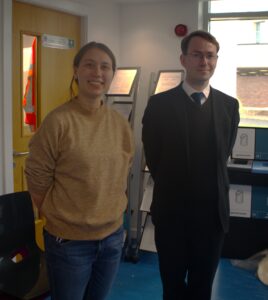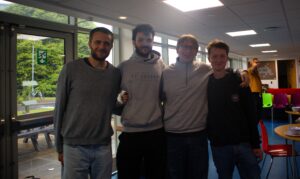On June 25th, recent PhD graduate, Dr. Gregor Haywood, took to the stage to receive the 2025 “Best PhD Dissertation” award from the Scottish Informatics & Computer Science Alliance (SICSA).
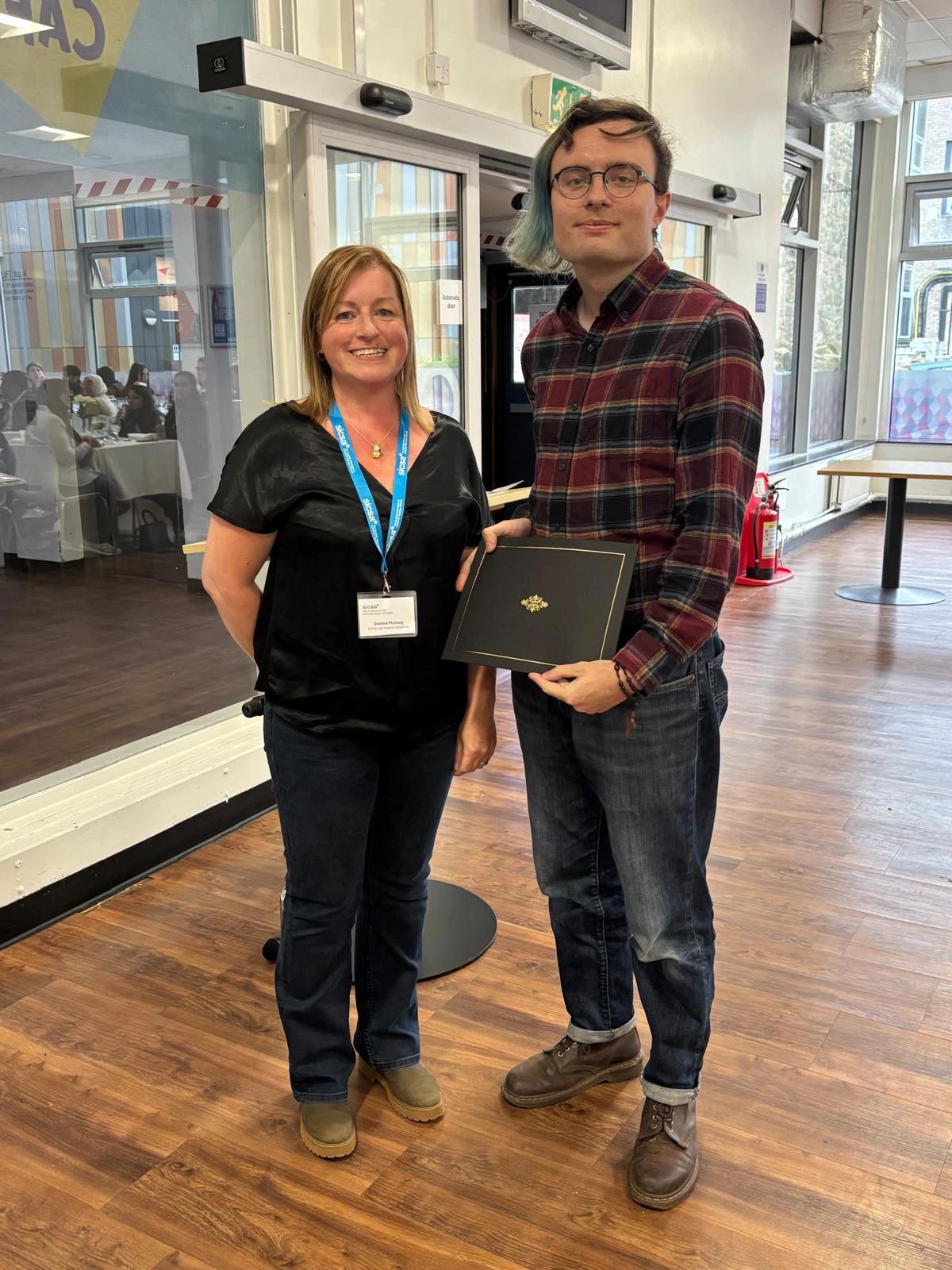
Gregor (Lecturer in the Department of Cybersecurity and Computing at Abertay University, and PhD Award Recipient) standing next to Debbie Meharg, Head of Applied Informatics at Edinburgh Napier University, Director of Education for SICSA, and the Awards Chair for the SICSA PhD Conference 2025
Haywood’s thesis on “Enhancing Privacy for Secure Internet Communications Using ILNP” focuses on how underlying communication protocols for the Internet could avoid privacy leaks, while continuing to utilise existing and unmodified hardware, infrastructure, and Internet services. His study was driven by his academic interest in the unintended design consequences within large interconnected systems:
I was captivated by working on a project that was socially relevant, deeply technical, and – ultimately – solvable. During my undergraduate degree, I started looking at private communication mechanisms as a side project which turned into my fourth year dissertation, and continued onwards within my PhD. I like finding these unanticipated problems, such as privacy leaks, security vulnerabilities, and environmental impacts, then designing new solutions that fix the problems without disrupting the operation of the larger systems at play.
(Dr Gregor Haywood)
Professor Saleem Bhatti (School of Computer Science, Thesis Supervisor) adds how Haywood’s work demonstrates what he believes to be ‘the first deployable mechanisms for perturbing traffic flow correlation attacks at the network level, as well as perturbing privacy attacks by traffic analysis as might be performed by a machine-learning system.’ For this reason, he was enthusiastic to nominate Haywood’s thesis for SICSA stating it is ‘an excellent balance between science and engineering’ that explores ‘a radical new architecture in addressing using the Identifier Locator Network Protocol (ILNP) to provide new privacy features, and an open-source implementation in FreeBSD that is usable across the existing Internet.’
The SICSA PhD Conference is a flagship event that brings together various participants from fourteen Scottish Universities to network, seek graduate researcher training, and share current interdisciplinary projects. Dr. Tristan Henderson (Senior Lecturer and Computer Science Director of Postgraduate Research) comments that submitting to awards like SICSA encompasses the primary aim of a PhD which is ‘learning how to become a researcher.’ For this reason, SICSA is a valuable opportunity that allows for ‘visibility’ and ‘recognition’ of one’s work both nationally and internationally adds Professor Bhatti.
In recalling his own researcher journey, Dr. Haywood expresses that whether it is learning a ‘can-do attitude’ from his supervisor or picking up fun new quirks such as ‘hoarding hand-me-down computer hardware,’ the School of Computer Science and his PhD research have given him the space to thrive for who he is:
I suspect I will always have a compulsive need to understand things deeply – but now I have the tools to harness that into computer systems research, and whether it is celebrating the wins at conference dinners with my peers, or consoling each other at the pub when it falls apart, it is hard to put words to the joy I have found in being part of a community that can match my passion, debate my technical points, and jump on board with my research tangent conversation starters.
It’s also very exciting to celebrate a success in privacy research. Many headlines are about data breaches and privacy failures, and so much research is about finding new privacy vulnerabilities. Being able to say “we made things better” is a great opportunity to inject some hope into the research community.
(Dr Gregor Haywood)
This elation also extends to the pride that both Dr. Henderson and Professor Bhatti feel towards having an alumnus from the School of Computer Science win this award. ‘It is a great honour’ they both expressed, and a fantastic example of the impact of research outside of the university. Dr. Henderson adds that within Computer Science, there are a number of dissertation awards, including SICSA and the BCS in the UK, as well as the ACM internationally. He encourages students to indulge in these opportunities, with Dr. Haywood noting that ‘participating in this and other inter-institutional networking events was a valuable way for me to broaden my research mindset throughout the PhD’ and if you are considering applying yourself or nominating a student for it, ‘do it! You have nothing to lose and plenty to gain. Remember it is the reviewers’ job to judge your work, not yours – you just need to judge whether you have time to submit.’
Dr. Haywood is now a Lecturer in the Department of Cybersecurity and Computing at Abertay University with key aspects of his work being available to read online until his thesis is published in June 2026.
- “Ephemeral node identifiers for enhanced flow privacy”, G. T. Haywood, S. N. Bhatti. Future Internet, vol. 17, no. 5, pages 1-26, Apr 2025.
https://doi.org/10.3390/fi17050196
dataset: https://doi.org/10.17630/eb01ff53-f787-43e7-b2bb-5e32337420a7
- “ILNP software prototype implementation in FreeBSD14”, G. Haywood. June 2024.
https://github.com/ilnp/ilnp-freebsd14
- “Defence against side-channel attacks for encrypted network communication using multiple paths”, G. T. Haywood, S. N. Bhatti. Cryptography, vol. 8, no. 2, pages 1-26. May 2024.
https://doi.org/10.3390/cryptography8020022
dataset: https://doi.org/10.17630/bf2ffcc2-8663-42a8-b019-ca18005236ba
- “ILNP – Identifier-Locator Network Protocol : FreeBSD 14.0 @ IETF118/Prague (dataset)”, G. Haywood, S. N. Bhatti, R. Yanigida, Jan 2024.
https://doi.org/10.17630/8a1f128b-8362-446e-8e7e-fea5a2dab97f
- “End-to-End Privacy for Identity & Location with IP”, S. N. Bhatti, G. Haywood, R. Yanigida. 2nd Workshop on New Internetworking Protocols, Architecture and Algorithms (ICNP 2021 – 29th IEEE International Conference on Network Protocols), Nov 2021.
https://doi.ieeecomputersociety.org/10.1109/ICNP52444.2021.9651909
ILNP web page: https://ilnp.cs.st-andrews.ac.uk
Blog written by Nina Globerson



